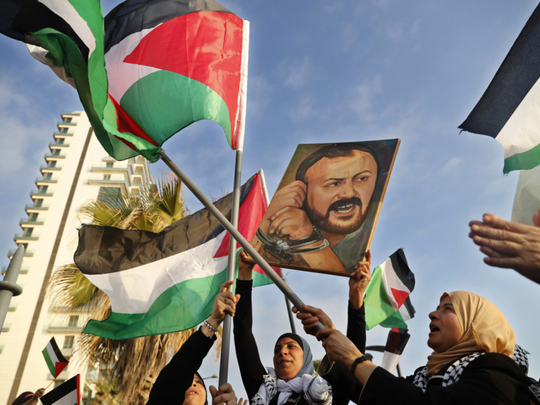
Sunday marked the end of four weeks of a hunger strike by more than 1,000 Palestinian prisoners in Israeli jails. The hunger strike, the largest since Israel’s occupation began in June 1967, is simply a peaceful form of protest that resembles the most noble political statement by an oppressed people against their oppressors. The prisoners are demanding, as they did in their 2014 hunger strike, better living conditions and more humane treatment of their lot.
Unlike previous Palestinian hunger strikes, the current strike gained worldwide publicity and was particularly highlighted in an essay by the most prominent prisoner of the Palestinian cause, Marwan Barghouti. The essay was smuggled from his jail in Hadarim, near Haifa, and published as an Op-Ed article in the New York Times on April 16.
The fact that the New York Times agreed to provide space to Barghouti to freely express his personal views and his 15-year experience languishing in an Israeli jail, is highly unusual and very significant. It clearly indicates that the public in the West, including in New York, is rapidly getting tired of Israel’s most brutal colonial policy that is being pursued by Benjamin Netanyahu’s government.
Netanyahu was particularly annoyed by Barghouti for smuggling the essay out to the New York Times and punished the Palestinian leader by instructing the prison authority to place him in solitary confinement in another prison. The essay revealed Israel’s heinous prisons policy against Palestinians. Israel implements a dual legal regime. On the one hand, the policy generally criminalises Palestinians for almost any form of protest while, on the other hand, it provides total impunity for Israelis who commit various kinds of crimes against Palestinians. The prisoners’ demands are very basic and they include requests for more family visits, better health care, an end to solitary confinement and wider access to education.
No one expected that the hunger strike would necessarily force Israeli authorities to concede or change course concerning its heavy-handed approach when it comes to Palestinian prisoners. However, such strikes are meant to deliver a meaningful message to Israel’s current right-wing government, as well as the Israeli public, that Palestinians have got basic rights in freedom and independence. Additionally, the hunger strike successfully stirred passions and established a state of national unity among Palestinians at large.
Barghouti himself is the perfect example of one who is both witness to and victim of Israel’s illegal system of unprecedented mass arrests and brutal treatment of Palestinian prisoners. There is nothing like it since the dark days of apartheid in South Africa when the late freedom fighter leader, Nelson Mandela, and thousands of other black leaders suffered at the hands of the apartheid regime. Mandela led a group hunger strike in 1966, two years after he was sent to prison. Their hunger strike was a political protest against the apartheid system, which was clearly an affront to humanity. Apartheid authorities tried in many ways to break the hunger strike, violating international laws, but failed miserably. The hunger strike protest proved to be quite a potent weapon in influencing public opinion worldwide.
The Republican hunger strikes at the infamous Maze Prison and other prisons in Northern Ireland, in both 1980 and 1981, during the Conservative government of Margaret Thatcher, widely advanced the Irish republican cause. The first hunger strike lasted for 53 days, and the Republican prisoners warned in a statement in February 1981 there would be further hunger strikes if they were not granted ‘special category status’ as political prisoners, rather than mere criminals.
This led to the beginning of the second hunger strike on March 1, 1981, initiated by the then leader of the Irish Republican Army (IRA) in Maze Prison, Bobby Sands. The strike lasted for more than seven months and ended on October 3, 1981, when Sands and nine of his comrades starved themselves to death in support of their cause. This strike historically established Sinn Fein, the political arm of the IRA, as a major political force in Northern Ireland.The Republicans organised twenty-two hunger strikes in Northern Ireland between 1917 and 1981 in protest against British rule. In newly released official documents, it was revealed that Thatcher had sent letters of “deep regret” to the families of those affected by the hunger strike.
When it comes to Palestinian prisoners, successive Israeli governments have not only failed to offer the affected families an equivalent show of remorse over the daily injustices committed in occupied Palestinian land, but have arrogantly refused to even recognise the presence of Palestinian prisoners. According to various statistics, there are more than 800,000 Palestinians, including children and women, who have frequented Israeli prisons since 1967.
However, the struggle continues as Barghouti said in his essay. “Decades of experience”, he said, “have proved that Israel’s inhumane system of colonial and military occupation aims to break the spirit of prisoners and the nation to which they belong, by inflicting suffering on their bodies, separating them from their families, using humiliating measures to compel subjugation”. Defiantly, he added: “In spite of such treatment, we will not surrender to it”.
Mustapha Karkouti is a former president of the Foreign Press Association, London. Twitter: @mustaphatache.










